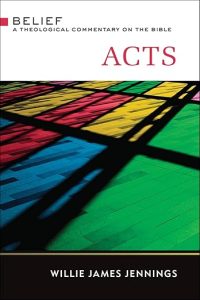 Takeaway: Commentaries are under-appreciated forms of devotional literature.
Takeaway: Commentaries are under-appreciated forms of devotional literature.
In general, I do not read the Bible straight through in a reading plan. I generally read the bible either with the Book of Common Prayer or with a Liturgy of the Hours (this is the one I use right now mostly). I prefer dated versions where I read that day and that day only. If I get behind, I get behind.
But almost two months ago now I went on a silent five-day retreat. And I brought Willie James Jennings’ commentary on Acts, along with the Liturgy of the Hours and Reggie Williams’ Bonhoeffer’s Black Jesus as my reading content. I had wanted to read Jennings’ commentary on Acts, and I had just finished (really the first day I finished) Jennings’ Christian Imagination. So I wanted more from Jennings.
Reading his commentary on Acts alongside his constructive theology in The Christian Imagination was exactly what I needed for that retreat. Being able to read slowly, and have lots of time to stop and pray through the commentary was perfect. Jennings is upending many White Evangelical readings of Acts. This was not my first book that approached Acts in a similar way, Amos Yong prepared me to read Jennings.
We often read Acts as a hero tale. We have hero Peter and then hero Paul that follow God and bring the good news of Jesus Christ to the gentiles. And that is undoubtedly part of the story. But Acts was not oriented toward individual hero stories. Acts was primarily about a community, one that was grappling with a God that had upended their concept of what it meant to be a follower of God.
Early Jewish followers of Christ understood God as the only God. But God the Father was also a particular God of their small ethnic group. To be a follower of God also meant to be Jewish. And if you were not Jewish ethnically, there was a category for people that would do everything possible to become culturally Jewish so that you might follow God.
But Acts, pretty much story by story disrupts that understanding. Pentecost, the first real miracle of Acts communicates the gospel to those that no longer could speak Aramaic. Peter and John’s healings show that the power of the spirit that was in Jesus was now also in his human disciples. Economics and community are upended with Ananias and Sapphira. Internal ethnic division within the early Christian community was disrupted with the distribution of resources to the windows. Peter’s message to Cornelius and then the Holy Spirit coming upon the household before baptism showed that the gospel was not just for Jewish Christians. The Ethiopian eunuch showed that the gospel was for someone that would have been permanently ritually unclean. And the book keeps going.
Part of the importance of Jennings’ book Christian Imagination was the rejection of supersessionism. In his commentary on Acts, Jennings builds on that but also works through how Acts has been misunderstood to allow for supersessionism. Jennings also works through the role of the state, the inherent violence of state power and prisons, the movement of power in economics and social control and the way that all of that is subverted into new ethic based on Jesus’ reimagined understanding of authority and service.
As you can assume from what I have said so far, this is not a book that is without controversy. But regardless of any disagreement, Jennings is taking seriously the text as his starting point. He is pointing out how we have allowed the book to be sanitized and misread because of our individualism.
I do rarely wait so long between reading a book and writing a post, but this is a book that I needed to marinate on. And it is a book I need to re-read. I commend it strongly.
Acts: A Theological Commentary on the Bible by Willie James Jennings Purchase Links: Hardcover, Kindle Edition